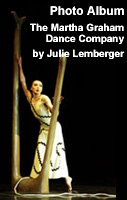






Go
back to Flash Reviews Flash Review Journal 2, 7-3: The
Poetry of The Swan By Alicia Mosier There's a poetic thread that runs through "Swan Lake," and it's easy to lose. Certain productions diminish it in favor of a focus on the pas de deux; others suffocate it under heavy silk costumes and spooky dry ice, or wrench it into a Freudian nightmare. Kevin McKenzie's production of the Petipa/Ivanov classic for American Ballet Theatre for the most part resists those temptations, and the thread remains intact -- an admirable achievement. This "Swan Lake" is about freedom and pursuit and identity. It's about the ache of desire in Tchaikovsky's opening chords. It's about Prince Siegfried's growing up. On June 20 at the Metropolitan Opera House, the entire line of the ballet -- its dance logic and its poetic meaning -- was concentrated in Ethan Stiefel's Prince. Stiefel is the pensive center of the first act, which takes place on the Prince's 21st birthday. His tutor (a subtle, witty Frederic Franklin) is present; his best friend, Benno (a jovial Joaquin de Luz), stands by his side; all the pretty girls blush when he looks their way. Benno dances with two of them in a taxing pas de trois. (Anne Milewski did high, strong jumps, but tired markedly; Anna Liceica's dancing was sticklike, all clipped lines and phrases.) Siegfried's mother (Rosalie O'Connor) reminds him -- for the hundredth time, we guess -- that he's supposed to be looking for a bride. She gives him a crossbow as a present: another symbol of the manhood he's supposed to be approaching. Stiefel is a golden son, honest and devoted to these figures of responsibility, but searching out his own identity, his own ideal. (No carefree cavorting in this performance.) The solo McKenzie created for the Prince in the middle of the party adds a rich dimension to the character. All those girls he tried out? They end up with the normal guys, sitting happily on their laps, while Siegfried dances alone and looks back again and again to his tutor, as if to say, "What am I doing wrong? What do I do next?" The Prince runs away from the party and into a thicket of trees. (Zack Brown's set and Duane Schuler's melodramatic lighting have a Mary Shelley feel.) Benno brings him the crossbow, now a talisman of the deep mysteries about life, death, and fate which this Prince has glimpsed in his Act I solo. In the forest, he discovers a life that's somehow parallel to his own: Odette, a princess trapped in the spell of the sorcerer Von Rothbart, is searching for herself as well. At the beginning of Act II, Amanda McKerrow's Swan Queen was desperate, frenetic, and full of anxiety. Her dancing looked brittle at times, a quality that Stiefel's clean dimensions and very quick partnering only heightened. But in the adagio passages, and especially in her immaculately performed solo, the ice melted into a snowy purity. (McKerrow's style is not glamorous, but it is guileless, which in "Swan Lake" may be a preferable quality.) The effect of Stiefel's high, piercing-the-darkness leaps was made even more breathtaking by the gentle set of his head -- it was as if he was flying through a thought. A turning point is reached when, at the beginning of the pas de deux, to four slow notes rising from a cello, Siegfried lifts Odette from the ground. For a moment, they're united in trust. Here, this simple gesture brimmed with truth and tenderness. When Stiefel's Prince pledged his love to Odette, it was both impetuous and from the depths of his heart. Even during their bows, he never stepped out of character -- he never stopped chasing his queen. The Swan corps in Act II carries the principle of the principals -- the pure dance energy that they heighten into drama -- to all its natural conclusions. This is not "Giselle"; the corps has no mission (it's not out to get anyone). Asking the reason for Petipa's swans is like asking the reason for Tschaikovsky's spectrum of woodwinds. Leading a bustling flock of twenty are four little cygnets (Tamara Barden, Elizabeth Gaither, Misty Copeland, and Xiomara Reyes, all rather mismatched, looking like baby birds indeed) and two big swans (Adrienne Schulte and the gloriously tall Marta Rodriguez-Coca). They scatter in arabesques and fly into formation. The corps on Wednesday was thoroughly rehearsed. I missed the blind togetherness of, say, a Bolshoi corps, and I kept wishing for more juice, more featheriness, in the upper backs, but the clean positions and noiseless pointe shoes did not go unappreciated. (Gaither poured so much emotion into every pique that it wouldn't surprise me to hear that she'd been dreaming of swans at night.) The corps in Act III bursts out in dynamic national dances, all with the vigorous clarity that also made the waltz around the maypole in the first act so thrilling. (Jerry Douglas and Sascha Radetsky gave a particularly lively Neapolitan dance.) Here, we're back in the world of Act I -- parties, aristocrats, brocade, bridal engagements -- but it's haunted now. The Prince sits with his mother at the side of the stage while the four princesses parade in front of them. As he waited, Stiefel's eyes were filled with that dark forest, that music, and those wings. Steifel is sometimes most interesting just standing still, when there's a situation welling up around him and a question coming up inside him. (Harris Green once reported in Dance Magazine that Stiefel refers to certain performances as "going method" -- as in Method acting. Come to think of it, this Siegfried has something of James Dean's rebel without a cause in him.) Stiefel's Prince didn't know what he was looking for, but he knew it wasn't any of the princesses he was supposed to be choosing from. (His body showed torment as well as princely restraint as he danced with each of them.) He certainly didn't expect what hit him next. I don't think anyone else was prepared, either, for the sight of McKerrow as Odile entering in a flash of smoke on the arm of Marcelo Gomes as Rothbart -- two dancers of implacable purity transformed into preening, glittering icons of desire. Gomes burst all the bubbles of the lovely princesses as he flung them around in killer duets. In a strong solo (this one also added by McKenzie), he held a long balance in arabesque, a mocking grin on his handsome face, like it was a magic trick. In the "Black Swan pas de deux," Stiefel and McKerrow were two spring-loaded pythons, hurtling toward and away from each other, bringing all the danger into the open. McKerrow spent the whole third act hissing through her teeth, trying to make her face do the seductive business her body's not quite made for. She didn't need to; the astonishing crackle of her attack was sufficient to tell us this Odile was a menace. Stiefel locked on to McKerrow, eyes ablaze. He extended the ending of every phrase, every landing: this was a Prince in free fall, shaken to his core, reaching out into the tantalizing dark. Siegfried betrays Odette, of course, pledging his troth to Odile with the same gesture (two fingers held trembling into the air) with which he pledged it to Odette in Act II. Rothbart thinks he's won; the spell that keeps Odette a swan will not be broken. When the doors of the great hall open and Siegfried sees Odette in torment, he realizes what he's done. He rushes back to the lake, into the midst of Odette's swan sisters (whose relentlessly shifting patterns signal their premonition of some tremendous change), and he begs Odette's forgiveness. This production's Act IV is perfunctory; the apotheosis (the two lovers seen together inside the rising sun as the music swells to a climax) seems to come too quickly. Even so, in his reunion with Odette, Stiefel brought together all the elements that made his characterization in the first three acts so fascinating. His dancing expanded throughout the ballet, visibly increasing in magnitude and dynamic range as his Siegfried experienced the many dimensions of freedom and responsibility. McKerrow embraced him with wild, tender abandon. There was no question that he would die with her. The tutor and the mother, the crossbow, the swans, the pledge of love (and the second pledge that almost broke it), the dive into eternal union -- the poetic line was completed. This Prince had found his life. |
|||||||



